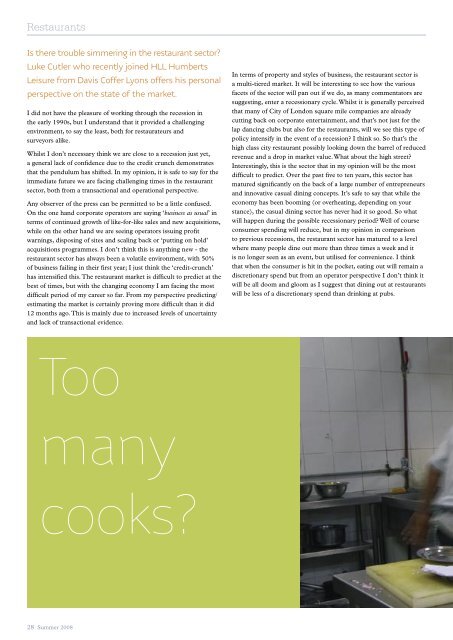0835 Leisure Summer 08_aw.indd - HLL Humberts Leisure
0835 Leisure Summer 08_aw.indd - HLL Humberts Leisure
0835 Leisure Summer 08_aw.indd - HLL Humberts Leisure
- No tags were found...
Create successful ePaper yourself
Turn your PDF publications into a flip-book with our unique Google optimized e-Paper software.
RestaurantsIs there trouble simmering in the restaurant sector?Luke Cutler who recently joined <strong>HLL</strong> <strong>Humberts</strong><strong>Leisure</strong> from Davis Coffer Lyons offers his personalperspective on the state of the market.I did not have the pleasure of working through the recession inthe early 1990s, but I understand that it provided a challengingenvironment, to say the least, both for restaurateurs andsurveyors alike.Whilst I don’t necessary think we are close to a recession just yet,a general lack of confidence due to the credit crunch demonstratesthat the pendulum has shifted. In my opinion, it is safe to say for theimmediate future we are facing challenging times in the restaurantsector, both from a transactional and operational perspective.Any observer of the press can be permitted to be a little confused.On the one hand corporate operators are saying ‘business as usual’ interms of continued growth of like-for-like sales and new acquisitions,while on the other hand we are seeing operators issuing profitwarnings, disposing of sites and scaling back or ‘putting on hold’acquisitions programmes. I don’t think this is anything new - therestaurant sector has always been a volatile environment, with 50%of business failing in their first year; I just think the ‘credit-crunch’has intensified this. The restaurant market is difficult to predict at thebest of times, but with the changing economy I am facing the mostdifficult period of my career so far. From my perspective predicting/estimating the market is certainly proving more difficult than it did12 months ago. This is mainly due to increased levels of uncertaintyand lack of transactional evidence.In terms of property and styles of business, the restaurant sector isa multi-tiered market. It will be interesting to see how the variousfacets of the sector will pan out if we do, as many commentators aresuggesting, enter a recessionary cycle. Whilst it is generally perceivedthat many of City of London square mile companies are alreadycutting back on corporate entertainment, and that’s not just for thelap dancing clubs but also for the restaurants, will we see this type ofpolicy intensify in the event of a recession? I think so. So that’s thehigh class city restaurant possibly looking down the barrel of reducedrevenue and a drop in market value. What about the high street?Interestingly, this is the sector that in my opinion will be the mostdifficult to predict. Over the past five to ten years, this sector hasmatured significantly on the back of a large number of entrepreneursand innovative casual dining concepts. It’s safe to say that while theeconomy has been booming (or overheating, depending on yourstance), the casual dining sector has never had it so good. So whatwill happen during the possible recessionary period? Well of courseconsumer spending will reduce, but in my opinion in comparisonto previous recessions, the restaurant sector has matured to a levelwhere many people dine out more than three times a week and itis no longer seen as an event, but utilised for convenience. I thinkthat when the consumer is hit in the pocket, eating out will remain adiscretionary spend but from an operator perspective I don’t think itwill be all doom and gloom as I suggest that dining out at restaurantswill be less of a discretionary spend than drinking at pubs.Toomanycooks?28 <strong>Summer</strong> 20<strong>08</strong>
















